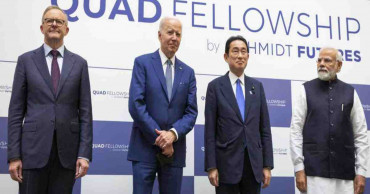Albanese
New Australian leader Albanese makes whirlwind world debut
Hours after being sworn in as Australia’s new prime minister, Anthony Albanese found himself fresh off a jet and thrown into the glare of a global spotlight Tuesday. He was rewarded with a warm welcome, as well as a bit of a gentle ribbing, from U.S. President Joe Biden and other leaders at an international summit in Japan.
“You were sworn in and got on a plane, and if you fall asleep while you’re here, it’s OK,” Biden joked as the leaders met at the Quad, an Indo-Pacific security and economic coalition meant as a counterweight to China’s growing influence in the region. Biden marveled at Albanese’s stamina. “I don’t know how you’re doing it. But it is really quite extraordinary, just getting off the campaign trail as well.”
The weekend election win for Albanese, from the center-left Labor Party, was a vivid change in Australian politics, ending nine years of conservative rule, the last several under former leader Scott Morrison.
Albanese has described himself as Australia’s first-ever political candidate with a “non-Anglo Celtic name.” He and Malaysian-born Penny Wong, Australia’s first foreign minister who was born overseas, were sworn into office Monday just before they flew to Tokyo for the meeting with Biden, Japanese Prime Minister Fumio Kishida and Indian Prime Minister Narendra Modi.
Albanese’s election came after a hard-fought campaign during which he caught COVID-19. Because his predecessor set the election date a week later than expected, Albanese had little time to prepare for the Tokyo summit.
For his efforts, however, he received friendly greetings from other leaders.
Also Read: Albanese sworn in as PM in Australia ahead of Tokyo summit
Kishida, in his opening remarks, took note of Albanese’s tight schedule, offering his “heartfelt appreciation for coming all the way to Japan right after the elections.” Modi said Albanese’s presence in Tokyo within 24 hours of his swearing-in “demonstrates the strength of our friendship within the Quad and your commitment to it.”
At the summit, Albanese stressed Australia’s unwavering commitment to the regional forum and stressed his country’s efforts to deal with climate change and look for greater engagement with Southeast Asian countries. He did not mention aggressive security moves by China, which many countries in Asia view with worry.
During the summit, Chinese and Russian strategic bombers conducted joint flights near Japan, Defense Minister Nobuo Kishi said, calling it an “increased level of provocation” and a threat to the Quad.
Chinese H-6 bombers joined Russian TU-95s over the Sea of Japan and flew to areas over the East China Sea, but did not violate Japanese airspace, Kishi said. Separately, a Russian IL-20 reconnaissance plane was spotted flying off the northern Japanese coast.
Kishi said Japan conveyed “serious concern” to both Beijing and Moscow.
China’s Ministry of Defense said the Chinese and Russian militaries carried out joint strategic air patrols above the Sea of Japan, the East China Sea and the western Pacific.
In a meeting later Tuesday, Albanese and Kishida shared concern about China’s new security pact with the Solomon Islands, the Japanese Foreign Ministry said. They also agreed to further cooperation in defense, a new U.S-led regional economic framework, clean energy and supply chain resilience, it said.
3 years ago
Albanese sworn in as PM in Australia ahead of Tokyo summit
Australia’s new prime minister was sworn in Monday ahead of a Tokyo summit with President Joe Biden while vote counting continued to determine whether he will control a majority in a Parliament that is demanding tougher action on climate change.
Prime Minister Anthony Albanese’s center-left Labor Party ousted predecessor Scott Morrison’s conservative coalition at Saturday’s election. The coalition had been in power under three prime ministers for nine years.
“I want to lead a government that has the same sentiment of optimism and hope that I think defines the Australian people,” Albanese said in his hometown of Sydney before flying to the national capital Canberra to be sworn in.
Albanese, who describes himself as the first ever candidate for the office of prime minister with a “non-Anglo Celtic name” and Malaysian-born Penny Wong, Australia’s first foreign minister to be born overseas, were sworn into office by Governor-General David Hurley before the pair flew to Tokyo for a security summit on Tuesday with Biden, Japanese Prime Minister Fumio Kishida and Indian Prime Minister Narendra Modi.
Biden rang Albanese to congratulate him on his election win and express the president’s wish to make the countries’ alliance stronger, the White House said.
Morrison’s decision to resign as prime minister during the early vote counting enabled Hurley, who represents Australia’s head of state, British monarch Queen Elizabeth II, to appoint his replacement without evidence that Albanese can control a majority of seats in parliament’s lower chamber where governments are formed.
Read: Global Covid cases near 528 million
Deputy Prime Minister Richard Marles was also sworn in and will act as prime minister while Albanese is in Japan. Katy Gallagher and Jim Chalmers were sworn into economic ministries.
Labor appears assured of 75 seats, one short of the majority in the 151-seat House of Representatives needed to form an administration. The conservative coalition was on track for 58, unaligned lawmakers 12 and six seats were too close to call, the Australian Electoral Commission said.
Australia’s two major parties, Labor and the conservative Liberal Party, bled votes to independents and fringe parties in Saturday’s election, continuing a trend of dissatisfaction with the political establishment.
Terri Butler, who would have been the new government’s environment minister, was replaced by Max Chandler-Mather, of the climate-focused Greens party that now holds as least three seats in the house, two more than in the last parliament.
Former New South Wales state Premier Kristina Keneally’s bid to move from the senate to the house in what was considered a safe Labor seat in Sydney was defeated by Vietnam-born independent candidate Dai Le, who became the first refugee ever elected to parliament.
Greens leader Adam Bandt supported a Labor minority government from 2010 until its election defeat in 2013 and was prepared to negotiate with Albanese again.
Albanese had been the government’s chief negotiator with its outside supporters in the house during those three years and was praised for his collegial approach.
“Liberal and Labor’s vote went backwards this election. Labor may get over the line with a majority and may not but their vote went backwards,“ Bandt said.
“The Greens and independents said we need to take action on coal and gas which are the main causes of the climate crisis and people agree,’ Bandt added, referring to Australia’s major fossil fuel exports.
“It’s the end of the two-party system as we know it,” he said.
The conservative former government lost six traditionally safe seats to so-called teal independents, greener versions of the Liberal Party’s blue color.
The teals want a more ambitious target that Labor’s promise to reduce greenhouse gas emissions by 43% below the 2005 level by the end of the decade.
Read: Russia presses Donbas attacks as Polish leader praises Kyiv
The previous government had stuck with the same commitment they made at the Paris Agreement in 2015: 26% to 28% below 2005 levels by 2030.
The Greens’ 2030 target is 75%.
3 years ago



